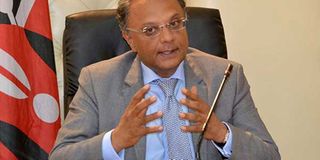Ministry, counties partner to train youth on blue economy

Vocational and Technical Training Principal Secretary Kevit Desai who has said that there is urgent need for institutions of higher learning to focus on developing skills, nurturing innovations and enterprise creation. PHOTO | SILA KIPLAGAT | NATION MEDIA GROUP
What you need to know:
- The ministry is partnering with Kwale, Taita Taveta, Mombasa, Kilifi, Lamu and Tana River counties.
- The government is working with stakeholders to expand business in the marine sector.
- The PS said the State has put in place relevant reforms and policies in the education sector to promote development of competencies.
The Ministry of Education has started working with six counties in the coastal region to promote technical training on blue economy.
The idea is to enable the youth to secure jobs in the maritime industry.
Vocational and Technical Training Principal Secretary Kevit Desai said there is urgent need for institutions of higher learning to focus on developing skills, nurturing innovations and enterprise creation.
“We have realised that the Coast region does not have enough competencies to enable it to actualise the blue economy agenda. There is a need to hold a post-Blue Economy Conference workshops in the region to create awareness and enhance community participation,” the PS told the Nation.
PARTNERS
The ministry is partnering with Kwale, Taita Taveta, Mombasa, Kilifi, Lamu and Tana River counties in a move to address the high rate of unemployment among the coastal youth.
“The Coast region needs to take the lead in training on the blue economy before others take advantage,” he said.
The ministry, in collaboration with the six counties, is focusing on creating centres of excellence in the blue economy sector, the PS said.
He noted that the ministry had picked the Kenya Coast National Polytechnic, which is set to benefit from a Sh1.1 billion World Bank loan, to be a centre of excellence in Marine and Hospitality training.
MARITIME ACADEMY
Bandari College has been upgraded to a maritime academy.
“Other institutions like Swahili Pot also need dedicated support to enable them to increase access to information for the youth,” he said.
The training programme has been supported by Kenya Commercial Bank and the Kenya Maritime Authority.
Dr Desai said the stakeholders will form a Technical Working Group comprising relevant agencies and institutions to drive the Coast Blue Economy agenda.
“There is an urgent need to look at the big picture of blue economy through a detailed study of the skills and job gap in the region and the country as a whole," the PS said.
RELEVANT SKILLS
The government is working with stakeholders to expand business in the marine sector, he said, and urged the youth to take advantage of the partnership to acquire the relevant skills.
Institutions need to form linkages to enable them to network and learn about the opportunities the blue economy has to offer, he said, adding, the State has put in place relevant reforms and policies in the education sector to promote development of competencies.
“The policies adequately address productivity, increasing access and equity and giving alternative pathways to achieving the required competencies,” he said.
“Training has to be of international standards, and this is why we have to ensure that we have the relevant centres,” he added.
There is need to identify resources that within the Coast and focus on youth engagement in developing sustainable programmes to hire them upon jobs graduation.





